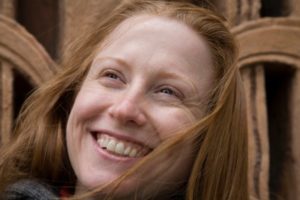 In the Spotlight
In the Spotlight
Renée Favand-See
Renée Favand-See a composer and soprano who lives in Portland, Oregon. Her works explore the music of words, of natural and made environments, of emotions and spiritual questions. These investigations yield vocal music of all stripes, Musique Concrète-esque electronic pieces, lyrically driven instrumental music, and counterpoint or the relationships that unfold in the spaces between voices. She is also a Walden alumna and faculty member.
How and when did you relationship with Walden begin, and what has been your involvement since then?
I started going to Walden in 1985, and I heard about Walden from Rosie Hollander, a friend from middle school. So thanks, Rosie! We both loved music–she played the piano, and I sang in a children’s choir in Maryland. She told me about the camp, and I went the next summer. I was there for five summers, starting when I was 12.
Since then, I taught on the Young Musicians Program (YMP) faculty for more than 10 summers. I started when I was a senior at Eastman School of Music. I really appreciated the spirit of apprenticeship in the Walden community; my mentors had been my teachers, and those relationships evolved as we became peers. That was a special experience, and very affirming for me as a young musician. I’ve been teaching at the Creative Musicians Retreat (CMR) since 2015 and have loved that as well. I think all teaching at Walden is connected by a foundation of gratitude. Teachers and students alike are so grateful to be in this incredibly nurturing, stimulating, and creative environment. I look forward to CMR every year, knowing I will feel how much the participants appreciate the experience, a nurturing environment which is unique in adulthood.
Could you describe a favorite memory from your time as a Walden student?
It is hard to pick! There is one memory I bring up often when I’m teaching text setting (how to set text to music). As a student, I wrote a song cycle called Bird Songs, and one of the songs had a text by Walt Whitman from Leaves of Grass. He’s looking up at the sky and he sees a flock of geese, and the poem reads, “Ya-honk! And it sounds down to me like an invitation.” I took the word Ya-honk, and I just went for it in my song, writing, “YA-HONK! YA-HONK! YA-HOOOOONK!” I got grilled in the Composers Forum, and was asked, “Did you have to be so obvious in your text-setting with the word Ya-honk?” It was a type of text-setting where the melody line kind of Mickey-Mouses, really doing what the text means.
That lesson stayed very much on my mind. I write a lot of songs these days, it’s my favorite thing to do as a composer, and I always think about Ya-honk. For the longest time, I put any kind of text-setting thing in the piano, and just kept the voice steady. I was probably 16 when I wrote that piece, and maybe 15 years later, I realized my mistake wasn’t setting ya-honk so dramatically–my mistake was choosing a poem with the word ya-honk in it! What else are you going to do? But that lively discussion has stuck in my mind, and I always tell my students the ya-honk story when we’re discussing tasteful setting of a vocal line of text.
Another memory is from one of my first classes at Walden, which was a eurythmics class with Dede Ondishko. We sat in a circle and the first thing we did was say our names and notice the accent structure. That was when I realized that my name was totally iambic–Renée Louise Favand–and that has stuck with me. These seeds from when I was quite young have taken root and borne fruit in so many ways, all my life. It has been amazing. When I set a text now, the first thing I pay attention to is the natural rhythm of the words. The music of a poem is rhythm-based, so I’m always trying to listen to that. That first exercise where we got sensitized to the accent stress and the syllables of spoken word has been a part of me ever since.
Then of course the hiking and joy of the dances and the joy of singing…just being in your body. Music-making at Walden is embodied in a beautiful way that lives in me now.
Could you describe a favorite memory from your time on faculty?
I had this hotshot group of three girls in my musicianship class who were close friends, all around the same age and were very goofy and playful and sweet. We were doing a dominant-seventh pivot drill, and they were nailing it–they were doing all the resolutions, all the pivots, and it was amazing. It was so much fun to teach them because they were so hungry to learn and so facile with their musical language because of the wonderful grounding they had-they had all been studying Walden musicianship for a few years already. But the V4/3, the second inversion dominant seventh chord, made Danielle Oberdier laugh. Every time we got to singing V4/3, she would just break into giggles. It was a running joke, because we would try to get through the pivot drill and Danielle would start laughing in the middle every time.
Along with that, constantly witnessing students’ excitement around learning and creativity. It’s so inspiring–I learn so much from that and Walden is where I learned to teach. I really felt that beautiful exchange-I was teaching the students and they were teaching me all along the way how to be a better teacher.
I was also thinking about CMR, and we always do Pauline Oliveros’ Rock Piece as an orientation activity. There was one year when we did Rock Piece and the silence after was this velvety, sacred silence. My ears were burst open with bird song and the breeze and the breath and the not-silence of it, and the feeling of connection in our little community that had only been together for a little while but somehow that piece connected us. The sensitive responses of the participants after, how moved everyone was, grew out of how we shared that moment.
Outside of Walden, how are music and creativity part of your life?
I’m a composer, largely of art songs and choral music, and I think Walden planted some beautiful seeds with all the singing we do. I’m also a teacher–I teach composition, theory, and orchestration at Portland State University. And also as a mother! I am realizing that mothering is a very creative activity, and all my training as a teacher is bearing fruit in this other context, which is really interesting. Improvisation is a core idea at Walden, making you flexible in the moment so you can adjust and shift with the direction things are going in. Listening is such a big part of teaching, and such a big part of mothering. Just being in the present moment for what might happen. The first year of mothering felt like a living meditation–“Pay attention. What is happening? Respond in the moment in the most authentic way you possibly can.”–and that is the core of creativity as far as I’m concerned.
I also wrote a song at the beginning of quarantine for my friend Arwen, who is a vocalist. She asked 12 composers to write songs she could sing and play herself. It was such a tricky time with my son’s napping, so I really had to leave the house to compose, but it was early enough in the pandemic that no one was really leaving their houses, and going to my studio felt totally taboo. I actually composed in my car using a water bottle drone. We had this water bottle that made a gorgeous gong-like drone, so I figured Arwen could tap the water bottle and sing. So I composed with a water bottle gong in the car while my son napped. I felt proud of my flexibility in that moment, finding a way through.
What is a non-musical hobby that’s part of your life?
Hiking is probably my favorite. We try to go hiking all through the year, no matter the weather. It’s a way to get the squirrels out of your head if you’re feeling stressed or anxious, just get moving on the trail and breathe. For me, nature is a connector to the sacred. It brings you into the moment; “I’m here now, and this place is so captivating, I’m just here to enjoy it.” My son Morgan, who is turning three, loves hiking. He keeps telling us, “I want to live where I can walk to the woods.” That is a great dream to have. My first taste of hiking was at Walden, and it has been in my life ever since.
What is your hope or dream for Walden’s future?
Just that Walden continues to thrive, bringing deep personal growth to people – participants, teachers, performers, listeners – across all socioeconomic and geographic boundaries, and continues to touch hearts through the sacred ritual of music. Walden is doing that. That’s the amazing thing. It branches out more and more to places all over the world, and tries to offer students of all different backgrounds the opportunity to study there. It’s a healing force in the world, and I just want it to keep sending ripples outward in all these branching, beautiful ways.

 In the Spotlight
In the Spotlight